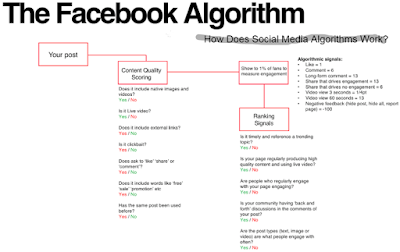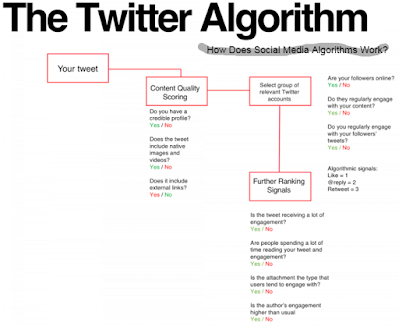
Social media
algorithms are always changing, making it difficult to stay up with marketing
codes of conduct. There’s no thanks to know every detail that goes into every
change, but we've an honest idea. counting on the platform you use your social
media expectations will differ. The algorithm live dictates where you rank in
social media ads and content placement.
In this guide,
you'll come to know what an algorithm is, the various social media algorithms,
and the way to optimize your content for social media.
What Are Social Media Algorithms?
An algorithm
may be a mathematical set of rules specifying how a gaggle of knowledge
behaves. In social media algorithms helps maintain order, and assists in
ranking search results for advertisements. On Facebook, for instance, there's
an algorithm which directs pages and content to display during a certain order.
As of last
year, there have been approximately 4 billion internet users, and of those
users, about 3 billion were on social media. That’s a huge undertaking to watch
and manage. this is often why algorithms are so crucial in determining the
validity and placement of social media accounts and content.
While there’s
no handbook on the various algorithms and the way to take care of them, we all
know enough to maneuver the social media landscape and succeed. one among the
main shifts witnessed within the past few years may be a user-friendly focus,
very similar to the one Google ranks by. This encourages social media users to
submit relevant, high-quality content, and have interaction with consumers.
Types of Social Media Algorithms
Social media
algorithms vary by platform. Therefore, you can break it down by social media
brand. the most platforms are Facebook, Pinterest, LinkedIn, Twitter, and
Instagram. Here’s a glance at each and how they’re currently ranking content
and users.
Facebook:

Meaningful
customer engagement is that the key to Facebook's algorithm layout. It's
created to accentuate the importance and viewership of local, familial and
friendly posts, instead of business posts.
Paid content is
ranked separately but still revolves around engagement, customer response, and
relevance to the topic matter. While user-friendly content is vital here,
another strategy the Facebook algorithm took on recently is spam management.
within the first three months of 2018, Facebook located and discarded quite 500
million false accounts.
Instagram:

Instagram is about
showing as many of us the maximum amount information during a day as possible.
Therefore, its algorithm focuses on every aspect of social media, from
relevancy and connection to engagements and content of an Instagram popularity.
The reasoning
behind the Instagram algorithm is to encourage comments, shares, likes, adds,
or further posting and Many More.
Pinterest:

The benefit to
the present interest themed algorithm is that it’s always showing the user
something Pinterest knows they like. This makes the content more likely to be
consumed and enjoyed.
LinkedIn:

Recognized as a
pacesetter in B2C marketing, LinkedIn may be a social platform dedicated to
networking, instead of building followers. It’s currently the foremost common
platform for Fortune 500 company use.
The site has
developed an algorithm supported connection and engagement, so strong and
relevant content is that the key to LinkedIn success. albeit you do not have
tons of links in your networking chain, you'll build this later if you've got
read-worthy content.
Twitter:

Twitter is
exclusive therein it ranks its posts not only by reference to the user but to
time and date posted. Fresh and updated material ranks above day-old news. the
amount of comments a Tweet has also will influence its rank.
Conclusion
Profit from Social Media Algorithms
If you are
taking anything faraway from this article, hopefully, it's that algorithms can
help, not hinder. Some social media users view algorithms as ropes which bind
us to a selected rule set, but they also create a map for success. It's
learning to read that map which can assist you overcome competitors and rise to
the highest.
Whether you’re
using social media for your own marketing needs, or you’re representing a
client, these platforms are a serious benefit to traffic and ROI. With a coffee
overhead (they’re free, after all), and minimal time commitment, social media
has the power to supply increased revenue with little to no output.
Learn how to Increased your Sales for E-Commerce - 8 Ways to Increase eCommerce Sales Using Seo
